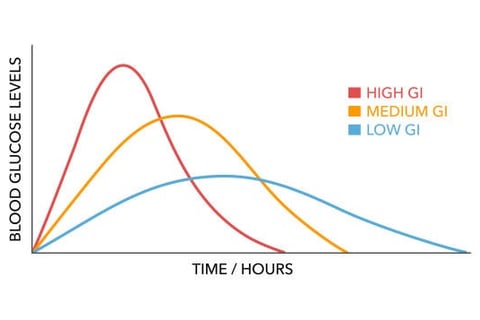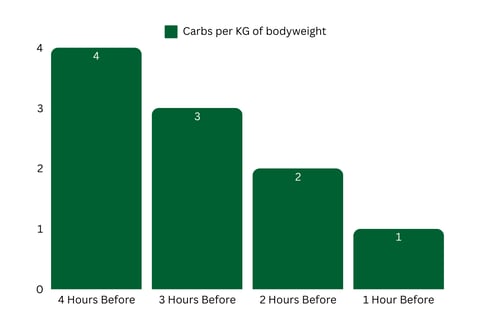Glycemic Index & Performance
How to use the Glycemic Index to inform your intake of Carbohydrates before & during exercise.
1/14/20253 min read


Planning what to eat before intensive exercise such as a Marathon or Hyrox can be tricky depending on how much time you have before the race after you have awaken. I've had disasters where I've crashed and burned miles from the finish line (see image of me in red t-shirt above) and triumphs where my energy levels remained consistent throughout the race (see image of me in black t-shirt below giving it spuds on the finish line). The main difference was the timing of my meals before the race.
One tool I have used to plan my pre-race meals is the glycemic index (GI) to understand how different carbohydrates affect my blood glucose levels. As a weekend warrior athlete looking to optimise performance to maintain steady energy levels throughout a race, understanding GI, glycogen storage, and carbohydrate timing has significantly improved my results.
What Is the Glycemic Index?
The glycemic index is a ranking system that measures how quickly a carbohydrate-containing food raises blood glucose levels. Foods are rated on a scale from 0 to 100, with higher values indicating a more rapid increase in blood sugar.
High GI foods (70-100): These cause a quick spike in blood sugar. Examples include white bread, sugary cereals, and certain fruits like watermelon.
Medium GI foods (56-69): These have a more moderate effect. Examples include whole wheat bread, brown rice, and sweet potatoes.
Low GI foods (0-55): These result in a slower, steadier rise in blood sugar. Examples include oats, quinoa, beans, and most non-starchy vegetables.
As shown above, consuming high-GI foods leads to a rapid increase in blood glucose, triggering a quick insulin response. This can provide a burst of energy but may also result in a subsequent blood sugar crash, leading to fatigue and hunger. On the other hand, low-GI foods provide a more gradual release of glucose, promoting sustained energy and better blood sugar control.
Providing carbohydrates have been consumed in adequate amounts leading up to intense exercise, glycogen is stored in the body as a readily available energy source enough for a maximum of 1-2 hours of exercise. During a race when energy demands increase, stored glycogen is broken down into glucose and released into the bloodstream or used directly by muscles for energy production.
Carbohydrate Timing Before Exercise
Therefore the amount, timing and type of carbohydrates you consume before exercise can impact performance. But the type of carbohydrate could result in digestive issues during the race (see image of me in red t-shirt below), so this has to considered.
4 Hours Before Exercise: A well-balanced meal with low-GI carbohydrates, lean protein, and healthy fats (such as brown rice with tofu and vegetables). This can increase glycogen stores and provides long-lasting energy.
3 Hours Before Exercise: A moderate-sized meal with a mix of low- to medium-GI carbs (such as oatmeal with fruit and nuts) allows for digestion while still fueling muscles.
2 Hours Before Exercise: A meal rich in complex, low-GI carbohydrates (such as whole grain toast with peanut butter and a banana) provides a sustained release of energy and keeps glycogen stores full. However, consuming low-GI carbohydrates too close to exercise may not be ideal, as they digest more slowly and may not provide readily available energy when it's needed most.
1 Hour Before Exercise: A smaller snack with moderate to high-GI carbohydrates (such as a smoothie with yogurt, berries, and honey) ensures quick digestion and a steady energy supply.
30-60 Minutes Before Exercise: A small snack with moderate to high-GI carbohydrates (such as a banana, toast with honey, or a sports drink) provides quick energy without causing digestive discomfort.
Conclusion
By understanding the glycemic index and its effects on my my energy levels has helped me go from face planting the wall to smashing through it, by preventing fatigue, and enhancing my endurance. By timing your carbohydrate intake, you can ensure that your body has the fuel it needs when it matters most, whether you're a serious athlete or just looking to do your first race.
With imperfection
Nick








